Dental Implants — Washington, DC
The Modern Way to Replace Missing Teeth
Your natural tooth is composed of two important components – the white, attractive crown that everyone’s familiar with, and the root hidden beneath the gum line. The root is a well-kept secret, but it provides essential stimulation and support to your jawbone. Traditional tooth replacement options only bother with replicating a lost tooth’s crown, which is good for aesthetics but not ideal for the patient’s continuing oral health or quality of life. The bone will gradually deteriorate over time, and many of these patients end up with a “hunched” facial appearance over time. That’s why Davidson Dental Associates strongly recommends dental implants!
Dental implants on K Street seamlessly replicate every part of a natural tooth, starting with the root for an enduring foundation. They’re beautifully lifelike, highly durable, and will last for many years to come. Please contact us today to schedule your first implant consultation.
Why Choose Davidson Dental Associates For Dental Implants?
- Dental Insurance Accepted & CareCredit Financing Available
- Entire Dental Implant Treatment Performed In-Office By Dr. Davidson
- Permanently Replace Any Number of Missing Teeth
What Are Dental Implants?

Dental implants are made up of three main parts: the dental implant post, the abutment, and the final restoration. The dental implant post is inserted directly into the jawbone where the missing tooth once was to replace its roots. This is what fundamentally sets dental implants apart from dentures and dental bridges. Instead of resting on top of your gums or relying on your remaining teeth, dental implants fuse with your jawbone to create a strong, comfortable foundation for your new smile.
On top of the dental implant post is a small connector piece called an abutment. It securely attaches the final restoration to the post and holds it in place. The final restoration could be a crown, bridge, or denture depending on the extent of your tooth loss. In the end, rebuilding your missing teeth from the roots up with dental implants gives you a smile that looks, feels, and functions just like natural!
The 4-Step Dental Implant Process
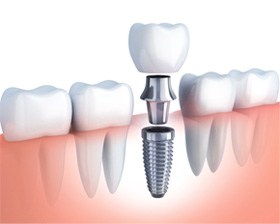
Because we have a team of several specialists here at Davidson Dental Associates, we can perform every single step of the dental implant process under one roof. Not only can you complete your entire tooth replacement journey with the dental professionals you already know and trust, but you can avoid the added costs and inconveniences of traveling to outside specialists. The exact details of the treatment process can vary from patient to patient, but here’s a basic breakdown of how dental implants work in Washington, DC.
Initial Dental Implant Consultation

Before anything else, you’ll need to attend a dental implant consultation to make sure you’re eligible for the treatment. This appointment will involve our team members examining your mouth and jaw, as well as asking you questions about your desires and expectations for dental implants in Washington, DC. Once our professionals have a clear understanding of your current oral health, we’ll let you know whether you can proceed with the dental implant surgery right away, or if you’ll need preliminary work first. It’s not uncommon, for example, to need bone grafting before the jaw can support implants.
Dental Implant Surgery
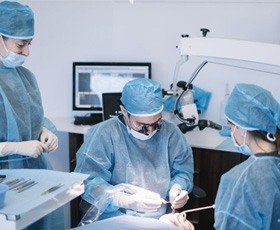
The prospect of dental implant surgery might seem intimidating, but believe us when we say there’s nothing to worry about. Our team of experts will make sure you feel comfortable before, during, and after the procedure. To that end, we’ll use local anesthetic to numb your mouth and jaw, and possibly sedation as well to calm your nerves.
As far as oral surgery goes, dental implant placement is pretty straightforward. After you’re fully numbed, we make careful, tiny incisions in your gums, which allow us to insert the implants at precise, predetermined locations and angles in your jawbone. Then, we close up your gum tissue and send you home to heal.
Dental Implant Osseointegration & Abutment
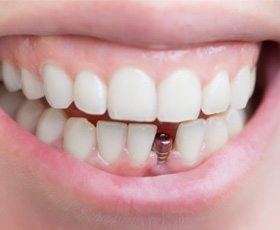
Although you’ll probably feel well enough to return to work within a day or two of your surgery, it can take up to six months for the implants to form a bond with the bone and tissue in your jaw. This natural process is called osseointegration, and it’s the reason why dental implants are able to feel as natural and last as long as they do.
When osseointegration is adequately complete, you might need to undergo a second surgical procedure, this one more minor than the implant placement. It involves accessing the tops of your implant posts and affixing them with small metal attachments called abutments. Abutments are responsible for holding your restoration (prosthetic tooth or teeth) in place.
Delivery of Dental Implant Restoration(s)

Once you’ve healed from your abutment procedure, we can start the process of crafting the dental crown, bridge, or denture that will fill the empty spaces in your smile. Your implant dentist in Washington, DC will take precise impressions of your mouth as it currently is, and a dental lab will fabricate your replacement teeth to mimic the ones you were born with. As soon as they arrive at our office, we’ll call you in and secure them to your abutments. At that point, your brand-new smile is complete!
Benefits of Dental Implants

Dental implants have quickly become known as “the gold standard of tooth replacement” by both patients and dentists alike. Not only do these titanium posts restore your smile, but they also rebuild the entire structure of missing teeth in a way you won’t find with other restoration options. By rebuilding pearly whites from the roots up, they can potentially boost your overall health, self-esteem, and quality of life. Read along to discover some of the most popular reasons our patients choose dental implants to renew their smiles.
Day-to-Day Benefits

- Natural appearance: Most people won’t be able to tell the difference between your real teeth and your dental implants. This is due to the custom-made porcelain restorations reflecting light similar to your natural enamel.
- Strong bite: Traditional restorations like bridges and dentures can potentially shift out of place while eating. Since dental implants are anchored to your jawbone, you’ll be able to munch on all your favorite foods as comfortably as with your permanent teeth.
- Simple maintenance: You won’t need to do any special tasks to maintain your dental implants. By regularly brushing, flossing, rinsing with mouthwash, and visiting your dentist for checkups routinely, you can easily preserve your new teeth for many years to come.
Health Benefits

- Comfortable tooth replacement: Unlike other restorations like dentures, you won’t have to worry about experiencing discomfort like tooth sensitivity, gum sores, and jaw aches. Some patients even forget they have dental implants because of how natural they feel.
- Protect natural teeth: Since your titanium posts will be directly anchored to your jawbone, they won’t need to rely on remaining teeth. They also prevent other pearly whites from shifting out of place.
- Comprehensive solution: This restoration option is the only treatment capable of stopping or reversing jawbone deterioration due to tooth loss. Not only will you preserve a strong and healthy foundation for your teeth, but you’ll also keep a more youthful facial shape.
Long-Term Benefits

- Reliable results: Dental implants claim an incredible success rate of over 95%, even 10 years after being placed! This means you can feel more than certain that your results will effectively restore your missing pearly whites.
- Long-lasting solution: If cared for properly, you can expect your dental implants to last anywhere from several decades to a lifetime. Even the restoration atop the titanium posts will be able to endure for many years, making this a more cost-effective solution compared to other traditional restorations that need more frequent replacements.
Who Dental Implants Can Help

No matter how many teeth you’ve lost, dental implants are able to recreate the appearance and feel of a full mouth of natural pearly whites.
Missing 1 Tooth
If you have lost a single tooth, our team can seamlessly replace it with a dental implant. After the implant has been surgically inserted into the tooth’s original socket, patients will undergo a period of healing. During this time, the natural tissue and bone will form around the biocompatible implant, creating a sturdy foundation for the restoration. Finally, Dr. Davidson will design an all-ceramic dental crown to fit over the implant. The tooth will be fully restored, and natural teeth nearby will not be harmed by this process.
Missing Multiple Teeth
Have you lost multiple teeth? If so, an implant bridge could be the best choice for replacement. Our team will place dental implants on either side of the space and then (once they’ve healed) attach the custom-made restoration over them for an attractive and strong result. Dr. Davidson prefers this reconstructive method to traditional bridges, which require healthy teeth to be filed down to accommodate dental crowns that work as the “anchors” instead.
Missing All Teeth
Implant dentures, like their traditional counterparts, are designed to replace a significant number of missing teeth. This type of prosthetic is more cost-effective than replacing each tooth with its own personal implant, as it will only require a small number of placed implants to anchor the full denture in place. Hybrid dentures are permanently fixed within the mouth so that they function just like natural teeth; alternatively, patients may prefer overdentures, which are designed to maintain the convenient removability of traditional dentures.
Missing All Teeth with Low Jawbone Density
One of the biggest requirements of undergoing dental implant placement is that there needs to be a healthy amount of bone in the surgical site. Unfortunately, patients who have been experiencing tooth loss for several years may discover that they fall short of this goal. Thankfully, our office offers mini dental implants as a successful alternative. Like the name implies, mini dental implants are simply a miniature version of the traditional implant, and they can be placed in much shallower areas of bone structure to support implant dentures.
UNDERSTANDING THE COST OF DENTAL IMPLANTS

Receiving dental implants requires multiple steps, including one or more oral surgeries. For this reason, they often cost more than traditional options. That said, they could end up saving you money in the long run. Dentures and bridges have to be repaired or replaced every 5-15 years. Think of all of the money (and time) you’ll save after a few decades that you would have otherwise spent on getting your teeth fixed. Most of our patients who have rebuilt their smiles with dental implants have gone on to say that they were worth every penny! Here’s what you can expect from the cost of dental implants.
Preliminary Treatments & Dental Implant Surgery

Patients who have any underlying or existing oral health issues may require preliminary treatments before continuing to get dental implants. These may involve services like periodontal therapy, tooth extractions, or bone grafting, which can all increase the overall price of the procedure. However, they’ll be necessary to ensure successful and long-lasting results.
Dental implant surgery also has its own cost. Fortunately, since we perform the entire process in one location, you won’t have to worry about visiting outside specialists to receive the treatment you need. This will also help you avoid needing to pay a bill from separate providers.
The Parts of Your Dental Implant

The price of dental implants can be influenced by several different factors, such as:
- Number of dental implants: Replacing a single tooth will cost much less than needing to rebuild an entire arch of missing teeth.
- Type of restoration: You’ll receive a restoration depending on the level of tooth loss that you’re experiencing. Smaller ones, like dental crowns, will be more affordable than bridges or dentures.
- Material: Your dental implant can be constructed out of various materials, such as zirconia and titanium. Of course, the former kind will cost less than the latter.
- Brand: Different companies manufacture dental implants based on the patient’s needs. Our team will only use the best products to provide the highest quality results for your smile.
How Dental Implants Can Save You Money

Those who are on a budget might be tempted to opt for dentures or bridges instead of dental implants because they have a lower upfront price. However, it’s the quality results as well as the overall costs that you’ll want to keep in mind for your ideal treatment. Dental implants won’t require as many replacements as often as other traditional restorations. You also won’t need special cleaning products to maintain your new pearly whites. Since your implants can last a lifetime with proper care and can help you avoid other costly oral health issues, you’ll be sure to save more money with them in the long run compared to bridges and dentures.
Does My Dental Insurance Cover Dental Implants?

Though most dental insurance companies won’t offer coverage for dental implants, some exceptions can be made. For instance, your preliminary treatments and final restorations may receive help, as they’ll be essential for restorative dental care. Make sure to speak with your provider to confirm the details of your benefits. You can also speak with our team for help with the process if necessary.
Making Dental Implants Affordable

If you don’t have dental insurance, you can still explore other options for making your procedure work within your budget. We offer plans through CareCredit—a third-party financier that can help split up the overall price of your treatment into monthly low-to-no-interest payments. This can help you save more money and renew your smile with dental implants without having to break the bank.
Dental Implant Post-Op Instructions

If you’ve never had oral surgery before, the process of having your dental implants placed may sound a little daunting at first. Fortunately, there is nothing to worry about! Thanks to modern-day techniques, sedation, and numbing medications, the dental implant surgery itself should be quite comfortable. Afterwards, you’ll go through a recovery period in which you’ll need to take certain precautions to care for your new smile. We will go over all this information with you in detail before your surgery, but in the meantime, here are some things you can expect after your procedure.
What to Do Directly After Dental Implant Surgery

It’s very likely that you’ll feel groggy after your surgery due to the sedation medication. It’s also not uncommon to continue to feel tired for a day or so as your body begins its recovery. Please refrain from eating or drinking anything other than lukewarm or cold soft items until the numbing medication has worn off completely. We also recommend that you take your first dose of pain medication before the feeling in your mouth fully returns.
Common Side-Effects When Recovering from Dental Implant Placement

For the first week or so after your dental implant surgery, you may experience side effects like:
- Minor discomfort. To combat soreness, apply an ice pack for 10 minute intervals, rinse gently with salt water, or take over-the-counter pain relievers as instructed. If your discomfort doesn’t seem to be getting better, don’t hesitate to give us a call!
- Intermittent bleeding: The tissue around the surgical site will be prone to injury, so be very careful while brushing and flossing around the area. Stick to soft foods until you’ve healed enough.
- Slight facial swelling: Swelling is a natural response after dental implant surgery. This may last for more than a week after your procedure, but it will gradually ease on its own.
Your Diet After Dental Implant Surgery

In order to prevent injury or infection to the surgical site, it’s important that you adjust your diet in the days that follow your dental implant surgery. You should avoid hard, sticky, crunchy, and acidic foods as well as carbonated or alcoholic drinks, as these can irritate the tissues in your mouth and interfere with the healing process.
Instead, stick to a diet of nutritious soft foods, like applesauce, cottage cheese, pasta, mashed potatoes, ice cream, and scrambled eggs. You can gradually add more foods and beverages to your diet as you feel comfortable doing so. We will also give you specific instructions and a general timeline to follow after your surgery.
Post-Op Health & Oral Hygiene

Preventing infection in the surgical site is essential for a successful treatment. You’ll need to brush your teeth for two minutes twice a day, being very careful around the dental implant. You should also floss and rinse with mouthwash daily, similarly being gentle around the sensitive area in your mouth. Do not spit forcefully, as this can dislodge the blood clot that the tissue needs in order to heal.
What to Do After Your New Teeth Are Attached

You will fully recover from your dental implant surgery in a few weeks, but it will take several months before your jawbone and dental implant finish healing together. Once they’ve fused, you’ll return to our office to have your new restoration anchored in place! This shouldn’t feel uncomfortable at all, and the most you can expect in terms of side-effects is some short-lived gum sensitivity. Overall, you’ll be ready to enjoy your brand-new smile right away!
Maintaining & Caring for Your Dental Implants

Dental implants can be an investment, so you probably want them to last as long as possible. The best way to ensure this is to take good care of them and perform regular maintenance. Don’t worry – for the most part, dental implants can be cared for the same way that natural teeth can! These tips will help you make sure you’re doing everything possible to promote the longevity of your new smile.
Make Oral Hygiene a Priority

It’s always important to brush and floss on a daily basis, but dental implants in particular can develop peri-implantitis if you’re not careful. Basically, this is a form of gum disease that eats away at the jawbone, causing the implants to come loose. Make sure you brush twice per day for two minutes each session, and floss at least once daily.
Eat a Healthy Diet

Carbs, sugars, and starches stick to your teeth and can accelerate bacteria growth. Enjoying a sweet treat here and there is okay, but eating too many too frequently will result in build up and, eventually, gum disease. It’s best to eat these types of foods in moderation and get plenty of fruits and vegetables in your diet.
Break Bad Habits
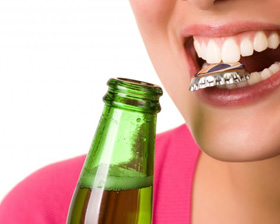
Some habits are just plain bad for your teeth – and for dental implants. Biting your nails, crunching on ice, and biting down on other hard objects can result in dental damage. Smoking, meanwhile, can harm your gums and oral tissue, compromising the stability of your implants.
Protect Your Dental Implants
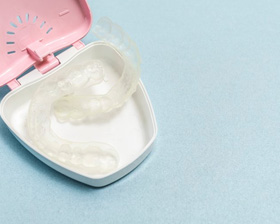
Do you play sports or engage in high-impact activities? Then you should probably wear a mouthguard. Dental implants are pretty sturdy, but even they will chip or break if you suffer a hard enough impact.
Schedule Regular Dental Checkups

Finally, remember to schedule a checkup with your implant dentist in DC once every six months. That way, we can help you monitor your oral health and dental implants. If we notice any concerning symptoms, we’ll promptly let you know and work with you to treat the issue or prevent it from happening altogether.
Dental Implant FAQs
Can I Get Dental Implants If I Have Gum Disease?
Gum disease is a preventable infection; however, it’s the leading cause of tooth loss. If you’ve lost a tooth or two from the infection, you won’t be a candidate for dental implants if your oral health is still compromised. The long-term success of your new smile relies on a healthy foundation and remaining infection-free. As a result, you’ll need periodontal therapy to treat the infection before your placement surgery.
Will I Need a Bone Graft to Get Dental Implants?
Besides periodontal therapy, some patients need bone grafting before replacing their missing teeth. You must have adequate bone density in your jaw to support your titanium implant posts long-term. Bone grafting thickens areas of your jaw that are weakened. Not all patients require bone grafting, but it’s common for those who have had advanced gum disease or missing teeth for several years. Although it adds another step to your treatment, it’s essential to ensure your bone fuses to the posts correctly. We’ll review a CT scan of your jaw during your initial consultation to determine if you need bone grafting before replacing your lost teeth.
Can Dental Implants Fail?
Dental implants are the most reliable solution to treat tooth loss; however, they can fail. Generally, the risk is less than 5% if you care for your new smile properly. The most common cause of dental implant failure is from a preventable infection called peri-implantitis. You can help prevent infection by committing to your oral hygiene at home and visiting your dentist at least twice a year for a cleaning and checkup. If you develop any concerning symptoms between your routine visits, don’t hesitate to contact our office, like redness, swelling, or pain.
Am I Too Old for Dental Implants?
If your jawbone has finished developing, there isn’t an upper age limit for dental implants on K Street. Instead, we consider other factors when determining your candidacy for the procedure, such as your oral and general health. There are certain medical and lifestyle factors that can increase your risk of complications. As a result, we’ll conduct an extensive consultation to ensure dental implants are the right choice for you.
Can I Use My Dental Insurance to Pay for Dental Implants?
Every policy is unique, but most plans can be used to help offset the cost of the treatment. Many times, you’ll be able to use your coverage to lower the amount you need to pay for certain steps in your plan, like periodontal therapy, sedation, or restorations. We’ll maximize your annual benefits to reduce your out-of-pocket expense to keep a complete smile within your budget.
